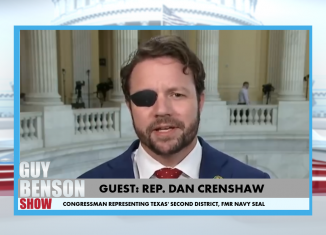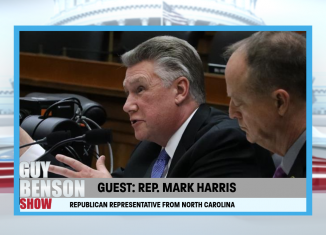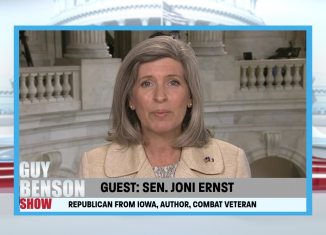Rep. Chip Roy (R-TX): Will Sit Down With McCarthy Next Week To Review “Frustrations” With Debt-Limit Deal
Listen Below:
Transcript:
Guy Benson: With us now, Congressman Chip Roy, Republican of Texas, the 21st District. And Congressman, good to have you back as always.
Rep. Chip Roy: Great to be on, Guy.
Guy Benson: All right. So there was the vote yesterday in the House. Obviously, it didn’t go the way that you were hoping for. You were making the case against the debt ceiling compromise bill ended up passing by more than 300 votes, majority of Republicans, majority Democrats, and now it moves over to the Senate. It’s happened. Right. It’s the argument, at least in the House, is over. Feel free to make some of your top points why you think it was a bad bill. Do you have any sense that there could be movement in the Senate on this or is this almost a done deal in your mind now?
Rep. Chip Roy: No, it’s pretty much a done deal, which is, you know, which is fundamentally the problem, Right. I mean, for the American people out there frustrated, this is the unit party or the cartel or whatever you want to talk about the swamp when it does what it does to just, hey, guys, we have to get a deal done to do a deal. And that’s what happened. It’s a maybe slightly better deal than we might have had had we not been negotiating all year, working to get limit, save, grow. But it ain’t a hell of a lot better. That’s why I’m frustrated, right? I mean, with notwithstanding the talking points from the Speaker’s office and my colleagues who supported the bill, let’s not forget, by the way, that more Democrats and Republicans voted for the bill and far more Republicans than Democrats voted no. Let’s not forget how many Democrats are out there today applauding it and saying, hey, can we now actually acknowledge that we got a really good deal? I mean, the fact is it’s it’s $4 trillion for, at best, a two year spending freeze. That’s it. And I’ll challenge anybody to debate me on that point. That’s what it is. You can call it a massive cut, the biggest cut in history, all these words, but it’s just simply not true. And anybody objectively looking at the math can say that’s not true. It’s effectively a two year spending freeze. And again, you get effectively a $4 trillion debt ceiling increase, as I say, effectively, because it really it’s an uncapped date. Right. It’s January 1st, 2025. So it’s an estimate that it will be about $4 trillion. It leaves in all of the subsidies, you know, for the Green New Deal, so to speak, that the Biden administration said will, quote, accelerate implementation of the historic clean energy and environmental justice investments and the Inflation Reduction Act. It’s got water down, snap permits. It actually increased the number of people that will apply and would cost $2.1 billion, according to CBO. I can keep going down the list, the IRS and everything else. The bottom line is it is what it is. The swamp won. We had a pretty good spring. We just had a big setback. And the only people applauding this are all the Wall Street types who were like, oh, my God, default. So average Americans are thanking us for fighting.
Guy Benson: So I just do want to ask you, because there were some obviously very strong conservatives who ended up voting for this deal, pointing to various provisions that they liked. I mean, you know, Thomas Massie, he is not someone who will just go along to get along. That’s he votes sometimes he’ll be the only guy voting against something on a pretty regular basis. He got something in the bill that he thought was important. So he got to. Yes, a guy like Jim Jordan. You know, I don’t think that people are going to say he’s he’s a bad conservative or, you know, a weak conservative. I’m not putting those words in your mouth. But are there things that you can understand why some of your very conservative colleagues eventually drew a different conclusion than you did on this?
Rep. Chip Roy: Well, again, I always like to talk to people There might talk about people and other people’s votes. They’re my friends. I prefer them to speak for themselves. I would make a couple of observations. The 20 who stood up in January were the 20 for a reason and the 20 all vote no. What I get what I mean. What I mean by that is the Freedom Caucus way some of those, like Thomas, for example, is not a Freedom Caucus. It’s not exactly all monolithic. Right. And some people who get their committee ships, their committee chairmanships, they start voting a little differently. You’re acting a little differently. And look, with all due respect, I don’t think that the 1% addition at the end of the year, which means on January 1st, there would be a 1% cap reduction if we haven’t passed all 12 appropriations bills. I don’t think it will have the effect that my friend from Kentucky thinks it will. Again, I let him speak for himself. I’m just saying I don’t think it’ll work that way. I think the swamp will basically jam an omnibus through in December using the same pressure points they just used to pass a $4 trillion debt.
Guy Benson: I mean, that’s entirely possible. There’s a chance that maybe it will look a little bit better because of some of these changes that they’ve made. Is there anything in the bill and I know that, you know, you’ve made your case against it. Is there anything in there that you think it’s like, at least not so bad? Like there’s some components that are decent?
Rep. Chip Roy: Yeah, of course. To that. I mean, I always appreciate your show and I always try to be honest about what I see on these things. I’ve been beating the snot out of it. Let me zero in. Like Garrett Graves. He’s a good friend. He did, I think, good work getting some of the NEPA reforms, which are the, you know, regulatory reforms that that halt a lot of the ability to produce both energy and roads. They’ve been long needed to get those reforms. Now, a little caveat. The problem is, is that if you’re subsidizing green energy, you’re not going to get the actual NEPA to be working for you for the non-green, i.e. the fossil fuel energy and the gas fired plants because the investments aren’t going that way. But that aside, the need for regulations are an improvement and then getting some cuts upwards of 40 billion, although I would question that number of cuts from the regulatory the I’m sorry, the bureaucratic state, what you would call non-defense discretionary spending, that is a step forward. It’s not as big of a step forward as out of preferred. And this is an important part. Sorry to filibuster.
Guy Benson: No, that’s why.
Rep. Chip Roy: They they’re playing some games. Right. They went in and they said, well, we’re rescinding COVID money, $29 billion. I could say that’s a good thing. But the problem is 6 billion of it is actually rescinded. The other roughly 22 billion is sitting over in an account in the Department of Commerce to be used to go backfill a lot of these nondefense discretionary accounts, because that’s the way Washington works. That’s why I say I believe I’m correct. And a lot of smart guys out there look at this, The Heritage Foundation, like Paul Winfree wrote on something today, you know, Chris Jacobs, you know, Chris, he wrote about the Massey proposal. I think these things are all going to result in effectively a continuation of this of the status quo, a spending freeze for a couple of years. It’s a slow down, but it’s like being at the Indy 500. You’re going 240 miles an hour down the stretch. You’re coming up the wall and you go, Oh, I’m going to let my foot off the brake a little bit and boom, you hit the wall. That’s where we’re headed.
Guy Benson: One other question on this. There have been a few people making a few noises about, you know, revisiting the leadership battle that we all watched in January because people were mad at McCarthy. Is that something that you are taking seriously here? Is this the type of deal that would threaten the speakership of Kevin McCarthy in your mind, or is that just kind of noise?
Rep. Chip Roy: Well, look, let me just say two things. One, Kevin has been working with us all through this Spring in good faith. And I will I’d like to return to that. I feel like this last week was not ideal. I think they cut a deal and the pressure of the moment, that wasn’t good. I think that deal that was cut does not completely comport with a lot of the agreements that we had. You know what? We had a meeting of the minds in January, and I want to revisit that because that was a part of how that all came together. I don’t like red lines. I don’t like threats. But what I said last week when people ask is I think there’s going to need to be a bit of a reckoning and a kind of review of how we’re organizing ourselves in order to get things done. Because what broke down this week was that we weren’t all sitting around the table. It’s not like, you know, it came back and said, okay, guys, here’s the deal. Here’s what was offered. They basically just cut the deal and then told us and we had to react because now we’re being asked to respond and vote on a deal that was cut, not with our approval. And I was happy to give them a lot of rope, you know, go out there, do what you can, but you got to kind of come back. So we got to we got to we got to have a sit down. I will say that. And I’m going to stay away from all that.
Guy Benson: Is he open to that? Like, have you spoken with him? Is he.
Rep. Chip Roy: Yep. I don’t like to talk about private conversations, but I will say in broad terms, we’ve we have spoken. Yes. That’s no, no magic. And and we will sit down next week and we need to I mean, look, there there needs to be a review of all of this, you know, where some on the conference are mad at some of us for voting against the rule. But we could not in good conscience vote for a rule that was essentially proceeding to legislation that was in direct contradiction to everything we had agreed to with respect to the spending levels we would fight.
Guy Benson: Yeah, So some of the frustration flows in different directions in some of this stuff, which is what happens when you have a relatively big tent and kind of a motley crew. I think talking through it’s a good idea. Sounds like that’s going to happen, which sounds good to me. Chip Roy, one of the leading voices in those conversations, Congressman from Texas, Texas 21. Congressman, always appreciate your time.
Rep. Chip Roy: Great to be on, Guy. You have a great weekend.
Guy Benson: You, too.







